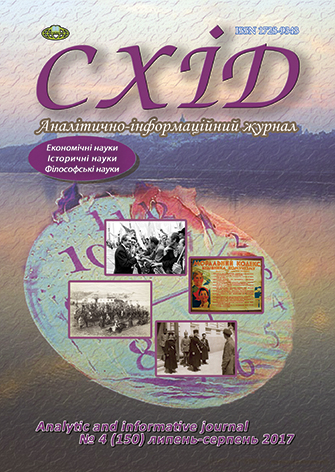Номадичні практики «варіювання меж» людини: Номо Моrtido vs Ноmo Mobilis
DOI:
https://doi.org/10.21847/1728-9343.2017.4(150).195517Keywords:
discourse, nomadic practices, a person’s “varying boundaries”, Homo Mortido, Homo Mobilis, “web of life”, “life instinct”, “death instinct”, libido, cathexis, thanatos, destrudoAbstract
The article has reviewed nomadic practices of a person’s “varying boundaries”: in order to survive in the hyphspace, a person has to determine which condition to adopt: Homo Mortido (by Paul Federn) or Homo Mobilis (by John Urry). It has been found out that nomadic practices of a person’s “boundary extension” contribute to their progress, aspiration to life and to the achievement of Homo Mobilis condition. It is stated that in the “web of life” (Fritjof Capra) a person acquires the “life instinct” (Ilya Mechnikov) and the “reflex of life” (Ivan Pavlov), which do not equally manifest themselves in different periods of human life. It has been proved that the introduction of nomadic practices of “varying boundaries” of a person, striving to live and reach the condition of Homo Mobilis, results in the “extension of their boundaries” and “going beyond” their own body. The author has studied the definitions of “mortido”, “libido”, “cathexis”, “thanatos” and “destrudo”. The author supposes that the introduction of nomadic practices of “varying boundaries” of a person who seeks to die by achieving the condition of Homo Mortido is fraught with “narrowing of their boundaries”, degradation and even death. In addition to the abovementioned, the person still has an opportunity and freedom to choose (perhaps not final) the acquisition of the following conditions: to be / remain themselves, to degrade, to “run on the blade”, as well as to strive for life or death. It has been assumed that both Homo Mortido and Homo Mobilis must exist in society. It has been proven that due to using nomadic practices that stimulate the instinct for self-preservation and libido, Homo Mortido will be able to refocus their potential and life chances similar to Homo Mobilis.
Downloads
References
Dvoretskiy I. Kh. (comp.) (1958), Drevnegrechesko-russkiy slovar (Ancient Greek-Russian Dictionary): Vol.1 (A - L). Moscow: Publishing House of Foreign and nat. dictionaries, 1045 ps. (rus)
Kapra F. (2003), Pautina zhizni. Novoye nauchnoye ponimaniye zhivykh sistem [The web of life. New scientific understanding of living systems]. Kyiv-Moscow: Sofiya, 336 p. (rus)
Knysh I. V. (2017), Antropolohichnyy trend: usvidomlenyy suyitsyd (homo mobilis). Materials of the scientific-practical conference of teachers, graduate students and students of Sumy NAU: in 3 volumes, Vol.1 (April 19 - 21, 2017, Sumy): pp.221 (ukr)
Knysh I. V. (2016), Filosofskyy dyskurs: rhizoma vs radix vs hyphe. Filosofiya i politolohiya v konteksti suchasnoyi kultury, 6 (15): 157-164 (ukr).
Kutyriov V. A. (2012), Vremya Mortido. St. Petersburg: Aleteyya, 336 p. (rus)
Mechnikov I. I. (1961), Etudy o prirode cheloveka. Moscow: Izd-vo AN SSSR, 290 p. (rus)
Pavlov I. P. (1973), Dvadtsatiletniy opyt obyektivnogo izucheniya vysshey nervnoy deyatelnosti (povedeniya) zhivotnykh [Twenty-year experience of objective study of higher nervous activity (behavior) of animals]. Moscow: Nauka, 661 p. (rus)
Freud Z. Po tu storonu printsipa naslazhdeniya. [On the other side of the principle of pleasure]. Available at: http://osp.kgsu.ru/library/PDF/398.pdf
Fursov A. I. (2007), Proshchalnyy poklon kapitalizma. Available at: http://www.apn.ru/publications/article17585.htm
Jung K. G. (1995), Psychological types [trans. from Germ]. St. Petersburg-Moscow, 718 p. (rus)
Federn P. (1952), Ego Psychology and the Psychoses. New York: Basic Books. 395 р. (eng)
Downloads
Published
How to Cite
Issue
Section
License
Copyright (c) 2017 Inna Knysh

This work is licensed under a Creative Commons Attribution-NonCommercial-NoDerivatives 4.0 International License.
1. Authors bear responsibility for the accuracy of facts, quotations, numbers and names used.
2. Manuscripts are not sent back.
3. The publisher does not always agree with the authors' opinion.
4. The authors reserve the right to authorship of the work and pass the first publication right of this work to the journal under the terms of a Creative Commons Attribution-NonCommercial-NoDerivatives 4.0 International License. This license allows others to distribute (copy) the published work for non-commercial purposes, provided there is mandatory attribution to its authors and a link to the first publication in our journal.
5. The authors have the right to conclude separate supplement agreements that relate to non-exclusive work distribution in the form in which it has been published by the journal (for example, to upload the work to the online storage of the journal or publish it as part of a monograph), provided that the reference to the first publication of the work in this journal is included.

